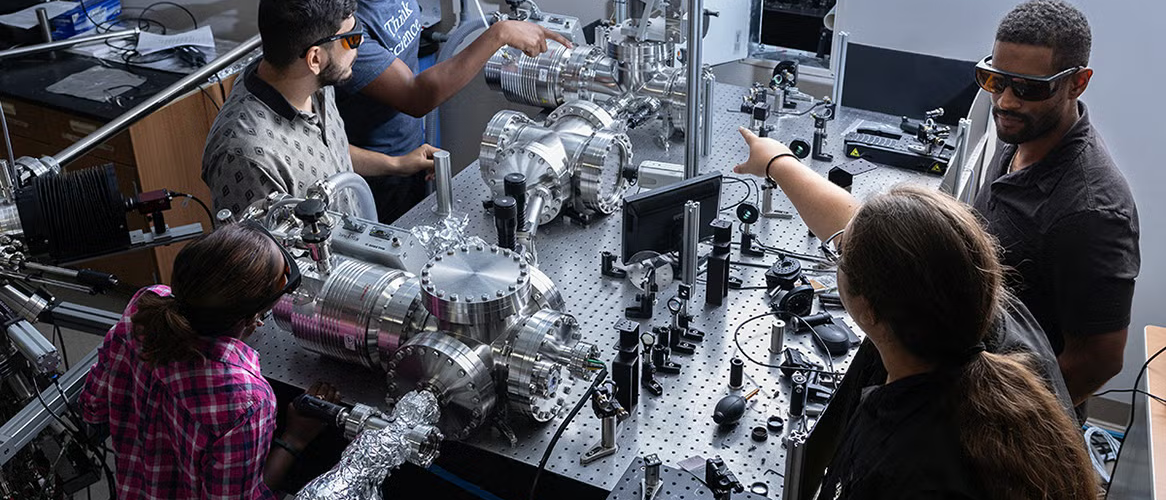UCF and the University of Washington (UW) were recently awarded $4.2 million for six years from the U.S. National Science Foundation (NSF) to establish a quantum materials research and education center as part of the Partnerships for Research and Education in Materials (PREM) program.
The funding will reinforce the existing partnership between UCF and UW’s Molecular Engineering Materials Center (MEM-C) and establish the Center for Quantum Materials Innovation and Educational Excellence (CQ-MIEE) at UCF. The center envisions high impact research training for students to make discoveries related to synthesis, structure and properties of quantum materials with topics divided into three interdisciplinary research groups:
- Electronic Structure and Light Matter Interaction in Layered Quantum Materials to discover ultrafast processes that happen in the timescale of one femtosecond in multiple layered quantum materials for potential use in electronic and photonic applications.
- Catalysis on Topological Materials to study and develop new catalysts that speed up the rate of chemical reactions by understanding the role of unique electronic states on the surfaces of various quantum materials.
- Quantum Material – Biological Materials Interfaces to unravel the underlying physical mechanisms that govern quantum material-biological material interactions that may be used for biomedical applications.
“A partnership between UCF and UW began in 2021 with a $800,000 PREM seed award that supported 20 students who produced 15 scholarly journal publications and 66 conference presentations. The new center is built upon the success of that seed program,” says Saiful Khondaker, a professor of physics and nanotechnology, and the principal investigator and director of CQ-MIEE.
There will be ample opportunities for students across grade levels to match their interests with the available programs, he says.
“The new PREM center will provide cutting-edge materials research and educational training to promising students at high-school, undergraduate, and graduate levels,” Khondaker says. “It will help participating undergraduate and graduate students to experience summer exchange programs and internships, receive joint advisement from faculty from both universities, attend conferences and publish joint research articles. A summer program for interested high school students will also be established to help introduce younger students to emerging topics of materials research.”
Khondaker says he is looking forward to the partnership between UCF and UW and guiding promising students to transform their lives.
“Our biggest success stories are our students,” says Parag Banerjee, UCF professor of materials science and engineering and one of the co-principal investigators. “Many of our undergraduate students have graduated UCF to attend graduate school and some have joined multinational companies as [research and development] engineers. Along the way, these students have been leading authors or been part of publications. Given only three years for the seed center, this is a remarkable achievement in and of itself.”
It’s rewarding to see the students benefit and flourish through PREM, Banerjee says. Even Lorraine Leon, associate professor of materials science and PREM adviser, learned through a PREM program at the City University of New York prior to teaching at UCF, he added.
“At the heart of it all, this a student centric center,” he says. “We passionately believe that the resources we put together as part of our center at UCF will benefit students and help them experience and conduct world-class research while exposing them to extraordinary opportunities with our partner center at UW. These experiences transform lives above and beyond what can be provided by a single degree program at one institution.”
Education, training and broadening participation are core aspects of UW’s mission, and the PREM with UCF provides a huge boost for MEM-C and UW to succeed in those areas, says Daniel Gamelin, a co-principal investigator, director of UW’s MEM-C and professor of chemistry.
“We have faculty and students in chemistry, physics and materials science collaborating with colleagues at UCF,” he says. “We are working together to synthesize and characterize novel materials and to fabricate specialized devices. We share samples and ideas between institutions and have many meetings and discussions to accelerate the development and creativity of our shared scientific mission.”
The collaborative nature of the PREM ultimately enriches the student learning experience with the summer exchange program being particularly fruitful, Gamelin says.
“Student research opportunities have grown in amazing ways over the course of the PREM seed and are set to expand even further with this new award,” he says. “The summer months are a special time for this PREM program. UW hosts students from UCF over the summer to join UW MEM-C research labs with a UW graduate student mentor and faculty advisor. The opportunity for UCF students to have extended stays in Seattle, becoming full participants in UW MEM-C research, provides these students with exceptional research experience while simultaneously strengthening the scientific relationships and products between our institutions.”
At UCF, 11 faculty advisors from the College of Sciences, College of Engineering and Computer Sciences, and College of Optics and Photonics are part of the new center.
UCF students interested in learning more about PREM may contact UCF faculty at prem@ucf.edu and visit the CQ-MIEE website here.
- Written by Eddy Duryea for UCF Today
- Dec. 5, 2025
